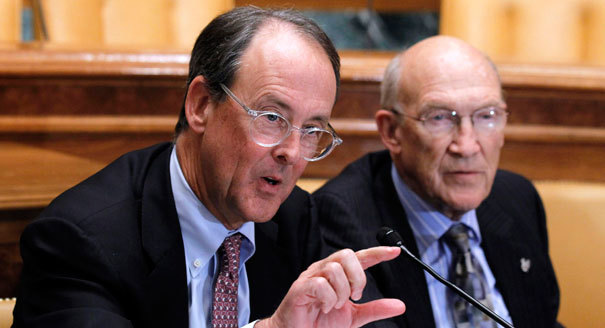Cut federal debt or the United States will cease to exist as a superpower—that was the message Erskine Bowles and Alan Simpson had for a packed house at Duke University’s Page Auditorium.
Bowles and Simpson, co-chairs of a congressional committee created through a 2010 executive order of President Barack Obama to address the nation’s fiscal hurdles, spread the blame evenly between the major political parties for the country’s $15 trillion debt during their Page Auditorium appearance in January.
“I believe that if Congress and the administration don’t wake up, that we face both the most predictable and also the most avoidable economic crisis in history,” said Bowles, a two-time Democratic U.S. Senate candidate in North Carolina, chief of staff to President Bill Clinton, and recent past president of the University of North Carolina system. “The deficits are like a cancer. They are truly going to destroy this country from within.”
Spending Cuts, Tax Hikes
Simpson, a former Republican U.S. Senator from Wyoming with a flair for colorful phrasing, argued for a combination of budget cuts and tax increases. He decried the notion that taxing the wealthy will bring the United States out of its fiscal woes.
“You can’t get there with taxes,” Simpson said.
The National Commission on Fiscal Responsibility and Reform, better known as the Simpson-Bowles commission, released a report in late 2010 recommending $4 trillion in debt reduction. The report suggested a 3:1 ratio of budget cuts to tax increases to manage the debt and called for holding federal spending to 21 percent of Gross Domestic Product.
The recommendations irked both Republicans and Democrats by reaching deeply into entitlements and defense spending, although Republicans generally have been more receptive.
Entitlement, Military Spending Reforms
The plan would shore up Social Security by gradually raising the retirement age to 69 by 2075 and altering the formula so wealthier wage earners would receive fewer benefits.
Regarding defense, the plan calls for slashing contractors, reducing the presence of U.S. armed forces in Asia and Europe, and scaling back military programs. On revenue, the plan suggests reducing the individual income tax rates to 8 percent, 14 percent, and 23 percent, and raising the federal gas tax by 15 cents per gallon.
Members of the commission voted to approve the plan Dec. 3, 2010, in an 11-7 vote, three votes short of the supermajority needed to endorse it officially.
Blame All Around
At their Duke University lecture, Bowles and Simpson drew applause for ripping organizations on all sides of the political arena—from Grover Norquist and Americans for Tax Reform to the American Association of Retired Persons.
“Any time you hear the word raising taxes, you’re supposed to go into a catatonic fit,” Simpson said. “Grover Norquist will visit your home and visit upon you a curse.”
Even so, Bowles said, the national debt isn’t a problem that elected officials can tax their way out of.
“You’d have to raise the highest marginal rate to something like 70 percent, the corporate rate to 80 percent, and the capital gains and dividend rate to 50 percent,” he said. “How many companies are going to be started in the United States with that kind of tax code? How many jobs are going to be created? Zero.”
Bowles said the $4 trillion debt-reduction figure isn’t the maximum or ideal figure, but “the minimum amount we need in order to reduce the deficit in order to stabilize the debt.”
No Long-Term Plan
Bowles and Simpson expressed frustration with the Obama administration and Congress for passing a stimulus package without first creating a long-term financial plan.
“The Congress turned around and passed the stimulus package,” Bowles said. “You can argue the pluses and minuses of a stimulus, but you can’t argue the point that if you’re going to have the stimulus, you should have had it in the context of long-term fiscal reform.”
Simpson acknowledged the political peril Obama would have faced in backing the commission’s recommendations. “If the president had adopted our program, he would have been torn to ribbons by his base, because in there is entitlement reform,” he said.
Bowles said he and Simpson are working with a bipartisan coalition in the House and Senate to put the commission’s plan into a bill for consideration this year. But he acknowledged the chances of anything of substance happening in an election year are “slim.”
$1 Trillion Interest Payments
“If we don’t do something about [the deficit], by the year 2020 we’ll be spending over $1 trillion a year in interest costs alone,” Bowles said.
“Not only is it a trillion dollars that we can’t spend in this country to educate our kids and to build our infrastructure and to perform the research that will create the next new thing here, it’s a trillion dollars that’s principally going to be spent in Asia educating their kids and building their infrastructure and creating the next new thing over there.”
David N. Bass (dbass@carolinajournal) is an associate editor of Carolina Journal, where this article first appeared. Used with permission.

